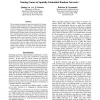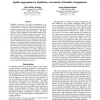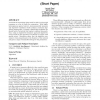38 search results - page 4 / 8 » Emergent Spatial Agent Segregation |
111
Voted
CORR
2006
Springer
15 years 1 months ago
2006
Springer
We investigate a prototypical agent-based model, the Naming Game, on random geometric networks. The Naming Game is a minimal model, employing local communications that captures th...
114
click to vote
ATAL
2010
Springer
15 years 2 months ago
2010
Springer
The coordination of emergency responders and robots to undertake a number of tasks in disaster scenarios is a grand challenge for multi-agent systems. Central to this endeavour is...
114
click to vote
AAAI
2004
15 years 3 months ago
2004
Qualitative assessment of scientific computations is an emerging application area that applies a data-driven approach to characterize, at a high level, phenomena including conditi...
125
click to vote
ATAL
2008
Springer
15 years 3 months ago
2008
Springer
A network of cooperating agents must be able to reach rough consensus on a set of topics for cooperation. With highly heterogeneous agents, however, incommensurable measures and i...
104
Voted
ATAL
2008
Springer
15 years 3 months ago
2008
Springer
An important challenge within the field of Criminology is to investigate the spatio-temporal dynamics of crime. Typical questions in this area are how the behaviour of offenders, ...



